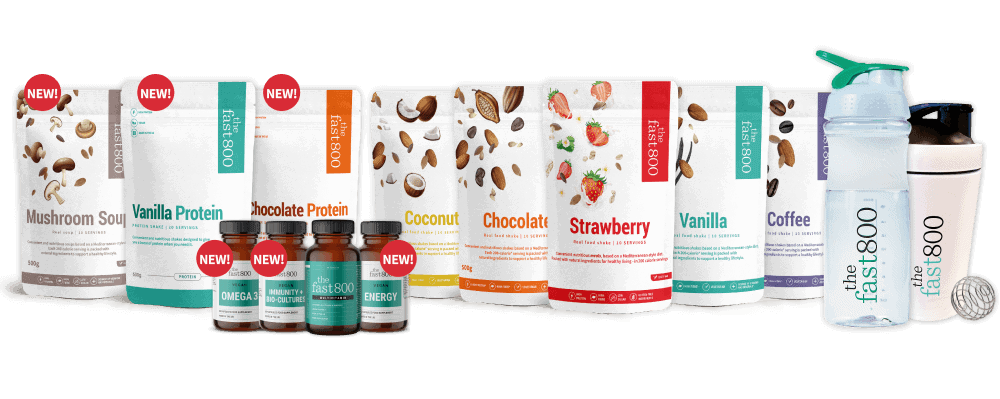What to eat on fasting days
A ‘fasting day’ can either be classed as a day of abstaining from eating completely, or as a day of consuming 800 calories or less. Here at The Fast 800, we use the term to describe the latter. Fasting comes with a whole host of health benefits and is an effective method of weight loss. If you’re deciding to try a fasting eating pattern, we know that it can be difficult to decide what to eat on fasting days to help you feel satiated.
We’re sharing the best foods to eat on a fasting day, and how this centuries-old practice can benefit your health.
What is fasting?
Intermittent fasting (IF) is an age-old technique of going without food for a period of time by incorporating fasting days or shorter eating windows into a diet pattern.
With food now being freely available to us 24/7, it’s easy to develop a habit of grazing, snacking or late-night eating. This means that your body is forced to continuously digest and process nutrients and toxins, with very little rest breaks. Fasting provides opportunity for your body to rest and repair as it should.
It must be noted that fasting isn’t necessarily for everyone, depending on factors such as health and age. Click here to find out who The Fast 800 is and is not suitable for.
Key fasting terms
To simplify the key terms associated with fasting, here are the main points you need to know:
Fasting day – a fasting day is either completely abstaining from food, or it can also mean eating just 800 calories in a day to reap similar benefits. For the purposes of our approach, The New 5:2, this means fasting for two days a week, and not calorie counting for the other five. Whereas, The Very Fast 800 approach involves eating 800 calories a day every day for a maximum of 12 weeks.
Time-restricted eating (TRE) – this is where you limit your eating to be within a certain window of time. For example, a ‘16:8’ eating window would involve consuming all your calories within an eight-hour period and consuming no calories in the other 16 hours (this includes the time you spend asleep).
Non-fasting day – non-fasting days involve no calorie counting, however, this does not mean you should choose junk or ultra-processed foods. At The Fast 800, our Way of Life approach exemplifies non-fasting days by following the principles of a moderately low-carb Mediterranean-style diet, without the need for calorie counting: simply eat good foods at mealtimes until you’re satiated. You can still practice TRE on non-fasting days by eating your meals within a specific time window.
Join our email community
Learn more about The Fast 800 approach to healthy living by receiving our free content, health tips and recipes as well as exclusive offers, delivered straight to your inbox.
The benefits of fasting
Fasting has been shown time and time again to have significant health benefits, whether you follow a 5:2 approach or a time-restricted eating pattern. Some of the benefits of fasting may include:
- Weight loss [1]
- Reduced risk of type 2 diabetes [2]
- Better sleep [3]
- Boosted mood and cognitive function
- Improved insulin sensitivity [4]
- Reduction in seasonal allergies and asthma [5]
- Prolonged life expectancy [6]
- Potential delay in Alzheimer’s, Parkinsons and multiple sclerosis [7]
If these benefits are enough to convince you to give it a go, then keep on reading to find out what to eat on fasting days.
What to eat on fasting days
Generally, when fasting, people choose to eat either three small meals a day or two slightly larger meals. Neither is right or wrong, it depends on what works best for you and your body. What’s most important is that you prioritise eating key nutrients while in your fasting window to help keep you full and nourished despite being on a restricted caloric intake.
So, whether you choose two or three meals, here are our top tips on what to eat on fasting days:
Eat plenty of protein
Protein and weight loss go hand in hand. Keeping a high protein intake is especially important when fasting, as your body cannot hold onto protein like it can with fats and carbohydrates. It keeps you fuller for longer, prevents muscle loss during weight loss, and helps to prevent weight regain when you stop counting the calories again. Try to keep to the recommended 60g or more of protein per day to stay properly nourished and energised. Some high protein, low calorie foods to eat on a fasting day include: chicken breast, eggs, cottage cheese, Greek yoghurt and salmon.
This high-protein Prosciutto Wrapped Chicken recipe is perfect for fasting days. Alternatively, check out some of our top high protein vegetarian meals for fasting.
Fit in your recommended fibre
Fibre is vital for good gut health and we recommend consuming around 30g fibre per day. It helps to keep your digestive system working properly and can relieve any fasting-related constipation. Read all about the benefits of fibre here. Some fibrous foods to eat on a fasting day are: broccoli, brussel sprouts, cauliflower, chickpeas and beans.
This tasty Saag with Chickpeas and this Baked Aubergine with Miso are both high-fibre dinner options for fasting days.
Don’t shy away from healthy fats
Healthy fats contain a variety of vitamins and minerals like B12, iodine, calcium and omega-3. They help keep you energised, assist with blood sugar control and maintain healthy cholesterol levels. While healthy fats can be higher in calories, it’s still important to include them in your fasting day meals. Some sources of fasting-friendly healthy fats are: extra virgin olive oil, avocados, nuts, olives and oily fish.
This Eggs and Avocado Keto Breakfast recipe is rich in healthy fats and helps to kickstart your fasting day, and this Keto Chicken Kiev is a delicious dinner option.
Explore shakes
Shakes are brilliant for boosting your nutrition on a fasting day. In a small amount of calories, these nutritional shakes can be the top up you need of your daily fibre, protein, healthy fats, vitamins and minerals. Our range of delicious shakes come in a variety of flavours to curb that sweet treat craving on a fasting day. Just one portion contains over a third of your daily protein and almost a third of your recommended fibre in just 195 calories. Conveniently in powder form, these shakes are ideal for keeping on hand at home for when needed: just add water, shake and you’re good to go!
Stick to Mediterranean-style foods
The Mediterranean diet is proven to be one of the healthiest eating patterns. Rich in flavour and nutrients, it’s naturally low-carb, and high-protein. Like fasting, it brings with it a host of health benefits, such as increased weight loss, better mental health and reduced risk of certain chronic illnesses. In fact, this diet has been shown to result in greater weight loss than a low-fat diet.[8] It’s for this reason that you do not need to count calories when on the Way of Life approach; simply follow the Mediterranean-style principals and eat until you’re full.
Don’t scrimp on the veggies
When fasting, it’s key to load up your plate with a large volume of non-starchy vegetables. Don’t worry about counting calories here, just fill your plate with a variety of veggies that will help keep you going. Broccoli, leafy greens, cucumber, leeks, mushrooms (to name a few), are all ideal for meal prepping in advance and keeping to hand ready to bulk out one of your fasting day meals.
Avoid snacking
Snacking not only risks you accidentally going over your 800 calories in a day, but also spikes your blood sugars and leaves you feeling hungrier later on. Studies have also shown that snacking can lead to elevated abdominal fat (visceral fat), signs of metabolic syndrome, insulin sensitivity and weight gain, therefore hindering any progress you may be making when following a fasting lifestyle.[9]
So, now you have a better idea of what to eat on a fasting day, head over here for ideas of what to drink on a fasting day with tips from our health coaches. Plus, to gain access to hundreds more delicious, fasting-friendly recipes, head to our Programme (both in app and online) here, or check out our range of shakes here.
Transform your fasting journey with our meal plans! Unlock over 700 recipes, home workouts, mindfulness meditations, and more. Explore, indulge, and thrive with our 7-day free trial.
GET STARTED
Varady KA, Bhutani S, Klempel MC, Kroeger CM, Trepanowski JF, Haus JM, Hoddy KK, Calvo Y. Alternate day fasting for weight loss in normal weight and overweight subjects: a randomized controlled trial. Nutr J. 2013 Nov 12;12(1):146. doi: 10.1186/1475-2891-12-146. PMID: 24215592; PMCID: PMC3833266.
Qasrawi SO, Pandi-Perumal SR, BaHammam AS. The effect of intermittent fasting during Ramadan on sleep, sleepiness, cognitive function, and circadian rhythm. Sleep Breath. 2017 Sep;21(3):577-586. doi: 10.1007/s11325-017-1473-x. Epub 2017 Feb 11. PMID: 28190167.
Harvie MN, Pegington M, Mattson MP, Frystyk J, Dillon B, Evans G, Cuzick J, Jebb SA, Martin B, Cutler RG, Son TG, Maudsley S, Carlson OD, Egan JM, Flyvbjerg A, Howell A. The effects of intermittent or continuous energy restriction on weight loss and metabolic disease risk markers: a randomized trial in young overweight women. Int J Obes (Lond). 2011 May;35(5):714-27. doi: 10.1038/ijo.2010.171. Epub 2010 Oct 5. PMID: 20921964; PMCID: PMC3017674.
Johnson JB, Laub DR, John S. The effect on health of alternate day calorie restriction: eating less and more than needed on alternate days prolongs life. Med Hypotheses. 2006;67(2):209-11. doi: 10.1016/j.mehy.2006.01.030. Epub 2006 Mar 10. PMID: 16529878.
Johnson JB, Laub DR, John S. The effect on health of alternate day calorie restriction: eating less and more than needed on alternate days prolongs life. Med Hypotheses. 2006;67(2):209-11. doi: 10.1016/j.mehy.2006.01.030. Epub 2006 Mar 10. PMID: 16529878.
Johnson JB, Laub DR, John S. The effect on health of alternate day calorie restriction: eating less and more than needed on alternate days prolongs life. Med Hypotheses. 2006;67(2):209-11. doi: 10.1016/j.mehy.2006.01.030. Epub 2006 Mar 10. PMID: 16529878.
Estruch R, Martinez-Gonzalez M, et al. Effect of a high-fat Mediterranean diet on bodyweight and waist circumference: a prespecified secondary outcome analysis of the PREDIMED randomized controlled trial. The Lancet: Diabetes & Endocrinology. 2016.
Clawson RC, Dela Cruz LN, Allen S, Wolgemuth T, Maner A, Dorsett A, I’Anson H. Continuous access to snacks from weaning onwards in female rats causes weight gain, insulin insensitivity, and sustained leptin resistance in adulthood. Physiol Behav. 2019 Mar 15;201:165-174. doi: 10.1016/j.physbeh.2018.11.026. Epub 2018 Nov 22. PMID: 30472395.









